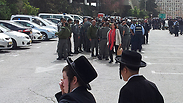
'On the symbolic side, this offensive law is dragging us into battle between brothers'
צילום: נועם (דבול) דביר
Haredi draft law is a real danger
Op-ed: Sticking fingers in eyes of haredim with criminal sanctions pushes pragmatic majority into arms of fanatical minority.
The haredi community is leaving the ghetto to the Israeli town square on Sunday in a show of force. The start switch is the hands of a 100-year-old man, Rabbi Shteinman, who is sensibly leading the young population group in Israel. The group, whose ethos is in the past, is the future: While among the secular public the number of children is 2.5 times the number of elderly people, among the haredim as many as 50 children run around every elderly person.
Half of the community is comprised of children under the age of 14. Their integration in the economy and their participation in carrying the burden are an existential necessity for the State of Israel.
The recent elections were aimed at promoting this issue, but it turns out that the effort was in vain. The legislation being advanced by the Knesset is a complete failure, the proportions of which have yet to be understood by the broad public. Those specializing in the haredi sector – from its harsh critics to its sworn lovers – agree that the law being concocted suffers from a double flaw: On the practical side it's ineffective, and on the symbolic side it's offensive and is dragging us into battle between brothers. It's hard to think of a worse outcome.
The law grants tens of thousands of haredim an exemption from service immediately (all those aged 22 and over) and thousands more in the short run (all those aged 18 and over once they reach the age of 24). There is no doubt that the High Court of Justice will be petitioned against this distortion, and if the judges implement the criteria under which they annulled the Tal Law, it's reasonable to assume that this law will be canceled too.
Those praising the law point to the fact that it has teeth: It sets "criminal sanctions" which will be executed in the future, when the haredim under the age of 18 celebrate their 21st birthday, in 2017. But these are false teeth: The set targets are small to tiny, and the definition of "haredi" is inflated with impressive creativity.
The required enlistment is of some 5,000 men a year (many of them for civil service) out of a pool of tens of thousands (aged 18-26). The number of those who fall out of the haredi society is not far from this target, and so it's clear that the real yeshiva world will not join in and carry the burden. And of course, by 2017 a political eternity will have passed. By that time there will have already been elections and a new coalition, and the Redeemer will have come to Zion.
If that is the case, why are the haredim launching a huge protest? This is where the law's symbolic failure hides. "The society of learners" cannot keep silent in light of a law implying that diligently delving into a Talmud page is a criminal offense carrying a two-year prison sentence. They liken it to Bolshevik-style anti-religious coercion. Indeed, the false teeth cannot bite, but they symbolize a direct attack on the center of identity of the haredi society in Israel, and that cannot be ignored.
The criminal sanctions are not just an empty populist promise, but also a real danger: Sticking fingers in the eyes of the haredim pushes the pragmatic majority, which is showing signs of integration, into the arms of the fanatical minority. If a civil disobedience develops, the consciousness of the young, huge generation of haredim may be engraved with an anti-establishment spark which will crush the possibility of integration. This will cause endless trouble.
This is not a necessary outcome. It's possible to draft significant numbers of haredim, two-thirds and more from every age group, without causing them to rebel. The haredim understand that the State does not have to fund Torah studies infinitely, and so economic leverages, smart carrots and tough sticks will activate the power of persuasion of Adam Smith's invisible hand even in the alleys of Bnei Brak.
The day chosen for the haredi mass protest is the first day of the month of Adar, in which the yeshiva world sings (the Purim theme) "v'nahafoch hu" ("turning upside down"). This is a perfect timing, as the suggested law is the opposite of the desired law.
It's time to tear the Purim mask off the face of the law which aims to advance an equal share of the burden, but which in practice will make inequality even worse. If the Knesset doesn't come to its senses, it may find itself facing not only a million haredim, but on the contrary – several million non-haredim.
Yedidia Stern is vice president of research at the Israel Democracy Institute and a professor of law at Bar-Ilan University










